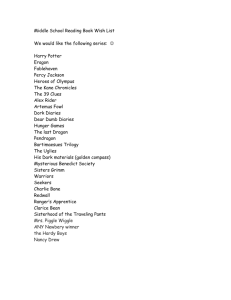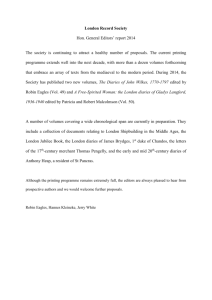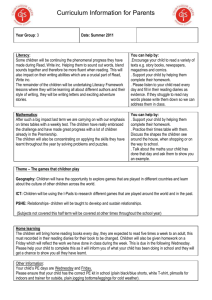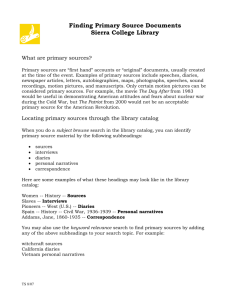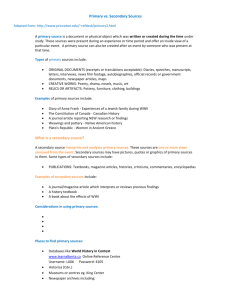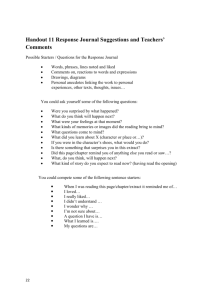Final draft - First Year in Higher Education
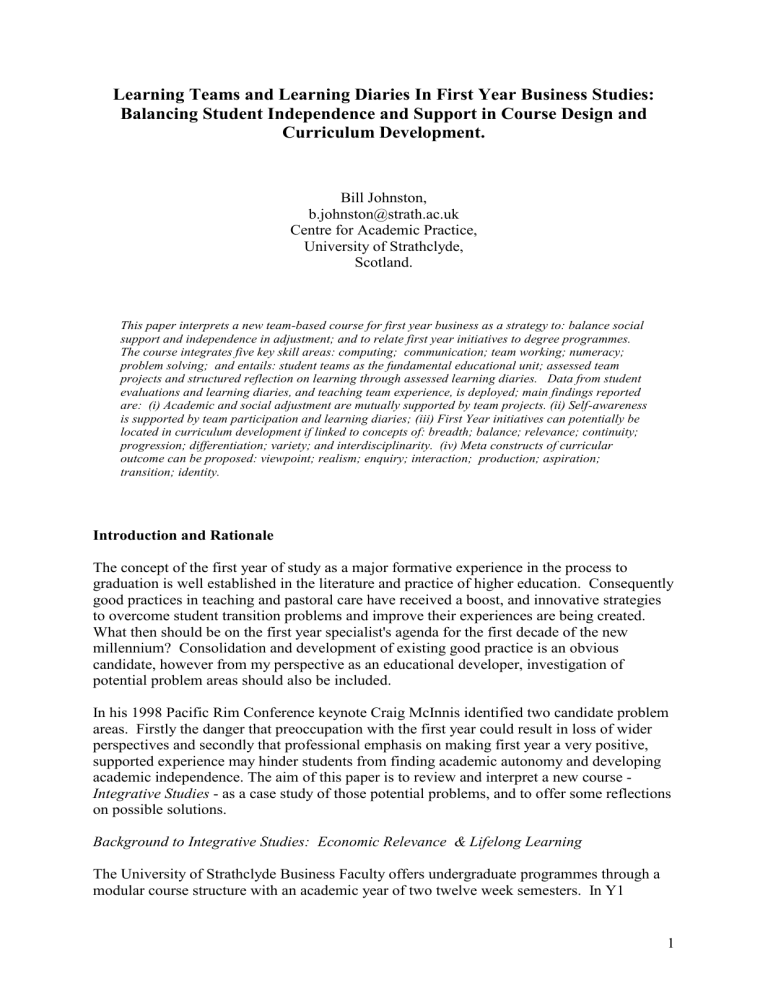
Learning Teams and Learning Diaries In First Year Business Studies:
Balancing Student Independence and Support in Course Design and
Curriculum Development.
Bill Johnston, b.johnston@strath.ac.uk
Centre for Academic Practice,
University of Strathclyde,
Scotland.
This paper interprets a new team-based course for first year business as a strategy to: balance social support and independence in adjustment; and to relate first year initiatives to degree programmes.
The course integrates five key skill areas: computing; communication; team working; numeracy; problem solving; and entails: student teams as the fundamental educational unit; assessed team projects and structured reflection on learning through assessed learning diaries. Data from student evaluations and learning diaries, and teaching team experience, is deployed; main findings reported are: (i) Academic and social adjustment are mutually supported by team projects. (ii) Self-awareness is supported by team participation and learning diaries; (iii) First Year initiatives can potentially be located in curriculum development if linked to concepts of: breadth; balance; relevance; continuity; progression; differentiation; variety; and interdisciplinarity. (iv) Meta constructs of curricular outcome can be proposed: viewpoint; realism; enquiry; interaction; production; aspiration; transition; identity.
Introduction and Rationale
The concept of the first year of study as a major formative experience in the process to graduation is well established in the literature and practice of higher education. Consequently good practices in teaching and pastoral care have received a boost, and innovative strategies to overcome student transition problems and improve their experiences are being created.
What then should be on the first year specialist's agenda for the first decade of the new millennium? Consolidation and development of existing good practice is an obvious candidate, however from my perspective as an educational developer, investigation of potential problem areas should also be included.
In his 1998 Pacific Rim Conference keynote Craig McInnis identified two candidate problem areas. Firstly the danger that preoccupation with the first year could result in loss of wider perspectives and secondly that professional emphasis on making first year a very positive, supported experience may hinder students from finding academic autonomy and developing academic independence. The aim of this paper is to review and interpret a new course -
Integrative Studies - as a case study of those potential problems, and to offer some reflections on possible solutions.
Background to Integrative Studies: Economic Relevance & Lifelong Learning
The University of Strathclyde Business Faculty offers undergraduate programmes through a modular course structure with an academic year of two twelve week semesters. In Y1
1
students are required to take modules in five subjects; in Y2/3 two principal subjects are studied; eligible students proceed to single or joint honours in Y4. Whilst this structure offers considerable breadth of choice, flexibility and depth of study it tends to militate against the development of interdisciplinary awareness and a coherent approach to transferable personal skills.
Following investigation of trends in business education and internal consultation the Faculty decided to modify the structure by introducing a new class - Integrative Studies - to form a spinal core of development in both transferable skills and interdisciplinary understanding over the first three years of the degree. In Y1 (introduced in Session 1999/2000) students are required to develop over both semesters the following five skill areas:
• Communication : presentation skills, e-mail, multi-media, written communication.
• Numeracy : data analysis, presentation and interpretation of statistics, correlation, probability, trends, survey design.
• Use of Specific Computer Technologies : word processing, spreadsheets, databases, internet, e-mail, powerpoint.
• Problem-solving : questionnaire design, sources of data, information seeking strategies.
• Interpersonal skills : leadership, group/team working, time management, planning, peer group assessment.
A major factor in the Faculty's decision is the UK government's policy on higher education (National Committee of Enquiry into Higher Education, 1997 -The Dearing
Report). That policy expresses the view that a major educational purpose must be to equip students with specific 'key skills' to contribute to an advanced, knowledge-based global economy and a learning society. The description of transferable knowledge, forms of thinking and communicating as 'key skills' is a major topic in the discourse of innovation and development in higher education practice in the UK (Drew, 1998), and internationally
(Teichler, 1999). The practical consequences are: (i) a need to explicitly develop, assess and credit student 'key skills' within degree programmes as preparation for employment ; (ii) a need to incorporate 'key skills' from first year, and to ensure their development in subsequent years. Achieving both aims in a degree programme would be a significant response to the economic targets of the state, and the associated idea of Lifelong Learning.
By placing a first year initiative in the context of a year on year progression to enhance specific skills and to cross disciplinary boundaries, the Strathclyde case cannot be met by an exclusive focus on first year, so the issue of wider perspective must be addressed. Therefore the connections between first year experiences and subsequent curriculum development must somehow be established and managed. To begin to address that matter, and also the issue of balancing the development of independence and provision of support in first year and beyond,
I will start by identifying educational principles aimed at optimising independent learning and social competence in higher education.
For these purposes I take student indepenence to mean not only reduced dependence on the lecturer and increased self reliance in study, but also the development of confidence and accomplishment in enquiry, analysis, discussion, reasoned judgement, and persuasive communication - the fundamental academic orientation. Allied to that notion, I view support in terms of the psycho-social wellbeing of students developed by their own agency and that of their families, peers, lecturers, counsellors and others.
2
Literature Review: The Dimensions and Foci of the First Year Experience
This review aims to contextualise the subsequent sections of the paper that describe and interpret the Integrative Studies case study by locating the specific project within the scholarship associated with the concept of the first year experience. The review may also provide a general context for locating such curriculum projects in relation to other first year strategies.
The literature on the first year of undergraduate study is complex, and falls within the province of scholars of higher education involved in: (i) providing research-based guidelines for improving course design, teaching, learning and assessment (Chickering and Gameson,
1987; Brown and Atkins, 1988; Raaheim, Wankowski and Radford, 1991; Ramsden, 1992;
Gibbs, 1992; Laurillard, 1993; King, 1993; Marton, Hounsell and Entwistle, 1997; Nicol,
1997; Biggs, 1999); (ii) developing encompassing theories of higher education (Chickering and Reisser, 1993); (iii) promoting professionalism in student affairs: (Barr and Lee Upcraft,
1990; Blimling and Whitt, 1999); (iv) investigating the overall impact of higher study on students and graduates, particularly the wide range of cognitive, social and affective outcomes entailed (Pascarella and Terrantzini, 1991); (v) conceptualising the problem of noncompletion (Tinto; 1989 ); (vi) promoting the efficacy of social integration (Gabelnick,
MacGregor, Mathews and Smith, 1990; Kuh, Schuh, and Whitt, 1991; Astin, 1993; Tinto,
Love and Russo, 1994); (vii) monitoring student experience of first year (McInnis, James and
McNaught, 1995); (viii) emphasising the relationship between undergraduate education and societal change (Candy, Crebert and O'Leary, 1994 ).
Drawing on this scholarship, the first year experience perspective can be explained firstly by identifying the following key dimensions of the student experience of coming into higher education:
• Transition
• Support
• Explicitness
• Staff/student contact
• Time on task
• Prompt feedback
• High expectations
• Collaboration
• Diversity
• Independence
The dimensions can then be used as a guiding framework for institutional, departmental and individual measures by staff and students to: orient and incorporate new students; lay down a sound basis for progress and development; anticipate and respond to difficulties and problem issues. A 'good' first year experience would therefore require policies, programmes and practices specific to each of the dimensions, ideally co-ordinated at institutional level. Any given ensemble of strategies and initiatives within the framework would aim to optimise and monitor the student experience of, and active engagement with, at least eight focal elements of the journey to graduation: (i) recruitment, retention and satisfaction; (ii) orientation, induction and adjustment; (iii) course design; (iv) the nature and quality of teaching, learning and assessment; (v) advice, guidance and pastoral care; (vi) administration and co-ordination of programmes and services; (vii) equity; (viii) co-curricular opportunities and issues.
3
By taking a large first year class as a case study, this paper concentrates attention on foci (i),
(iii) and (iv). Consequently the main research findings applied are drawn from work on improving course design, teaching, learning and assessment. Three key pedagogical principles to enhance the experience of learning can be identified to define and explain the reasoning behind the various educational practices entailed in Integrative Studies.
Learning for Understanding
Replacing the notion that learning is mainly about memorisation and test preparation, by a concept that prizes complex cognitive activity, and encourages interaction between cognition, social involvement and motivation when devising learning experiences. Thus encouraging intellectually complex and socially challenging approaches to study by students.
Teaching for Learning
Replacing the model of the lecturer as primarily a transmitter of disciplinary knowledge and examiner of student comprehension, with a model that seeks to improve student learning and adjustment by moving the student - personified as actively and confidently taking responsibility for developing robust understanding - to the centre of the educational stage. In this model the lecturer's role is characterised as organiser and facilitator of learning situations, and provider of timely feedback on student development.
Development for Lecturers
Recognition that pedagogical change is complex, time-consuming and evolutionary, and that change in the higher education context should involve lecturers not only developing a more facilitative style of teaching, but also adopting a scholarship based and research oriented educational practice.
Arguably if all three principles can be applied to a large first year course like Integrative
Studies, then we will increase the likelihood of achieving a healthy balance between development of student autonomy and social confidence in the learning situation, whilst reducing problems of passivity and alienation. Achieving such a balance would enable significant extension of the academic expectations that might be pursued in subsequent years, but would require some specific course design constructs to ensure degree programme coherence and systematic nurturing of the developing sense of academic independence and social competence. To simplify usage I will term this learning strategy 'guided independence'.
Integrative Studies 1999/2000: Towards Guided Independence
The class proposes the view that the abilities a student develops on the way to graduation are a complex of: disciplinary knowledge, dispositions, key skills, self-awareness and collaboration with others. Integration of this complex and demanding set of elements is the desired outcome of study and provides the class with its title. How then is integration to be initiated, sustained and developed through the learning strategy and teaching practice of a class of 280 new and diverse undergraduates?
Teaching, Learning and Assessment: Teams & Projects
We sought to implement the strategy of guided independence as follows:
4
• By instituting teams of between six and eight students as the basic educational unit as opposed to 280 individual learners thereby immediately challenging the alienation of traditional course designs, and placing the focus firmly on collaboration and interpersonal skill development.
• By making team projects the central feature of assessment and by devising team projects that focus on business problems (performance measurement and forecasting in first semester; establishing the market for a particular product in semester two). Projects require: group participation, planning and time management; practical research using data sets, internet and electronic library; production of business reports and preparation and delivery of oral presentations, incorporating statistical techniques and using relevant information technology. Having two relatively small scale projects in first semester allowed students to: get to know each other and the staff; gain experience of team working; and receive early feedback and assessment of performance.
• By providing a weekly blend of: Labs (1-2hrs) in computing, information technology and statistical techniques with student project teams timetabled together; whole class plenary sessions (1hr) and tutor facilitated team meetings (1hr) to provide information, guidance and training and allow scheduling of mini-presentations of team work in progress; a class web site, updated weekly, containing all the relevant information about the class organisation, lab worksheets, plenary points; invited speakers from business explaining their organisation's approaches to the team project topics. The teaching style and forms of staff/student contact stressed interaction, informality and staff approachability.
• By involving the whole class in decisions about content and process through feedback and dialogue, partly through ongoing discussion in the course of teaching but formally through a variation of classroom assessment (Angelo and Cross, 1993) carried out in a plenary session mid-way through first semester. Each student was asked to write views on the class on index cards together with suggestions for improvement and the cards collected and analysed.
• By getting students to reflect on their individual aspirations, experiences in groups, achievements, strengths, weaknesses and areas for further development through an assessed learning diary comprising: review of progress between team projects; general essay on the integrative experience; checklist of all five skill areas with specific examples to encourage systematic and periodic review of individual progress in all areas. The diary is submitted for assessment and feedback at the end of each semester, so students have two rounds of systematic reflection and feedback.
• By organising the staff as a combined course design and teaching team. The team meets weekly and comprises lecturers from Management Science, Information Science,
Economics, and Statistics supported by graduate teaching assistants. I work with the team from an educational development and evaluation perspective, contribute to some whole class sessions and also facilitate and assess a number of student teams. The Class is managed by a professor reporting to the Faculty, and there is a part-time administrator.
Accommodation includes: lecture room with whole class capacity; adjacent rooms to allow a degree of flow between large plenary meetings and smaller gatherings of teams; bookable computer labs. and a class office. Meetings are held weekly to review progress, plan ahead and evolve the class through our observations of student activity; team
5
'marking' sessions are held to ensure validity and consistency of assessment and to develop shared understandings.
The Student Experience of Integrative Studies: Observations, Feedback & Learning Diaries
This account draws on student feedback gathered from the whole class, insight drawn from a sample of individual student learning diaries and staff observations.
Orientation and Early Adjustment : Student Feedback
The following summary of student feedback (data collected on index cards during whole class meeting in mid-semester one) gives a flavour of student's early response to the learning environment.
• Staff approachable and responsive to students.
• Early anxiety over expectations e.g. first team project.
• Criticism of Performance Management as a topic choice - too abstract.
• Web site useful and user friendly.
• Labs practical with helpful tutors and worksheets.
• Teams a valuable way of developing interpersonal skill and getting to know people; more time should be given to teams, less to whole-class sessions.
• Some calls for more control and guidance by lecturers.
• Involvement of outside business representatives generally welcomed.
We fed these points back to the whole class and collaboratively agreed more time for team working in second semester thereby encouraging students to share responsibility for teaching decisions with us and each other. Making the change to more team working sooner would have compromised aspects of the class schedule for the rest of semester one, and we also felt it prudent to give students more time to settle in and get feedback on performance in teams before increasing their autonomy and self-management responsibilities. This approach acknowledged the various anxieties present in the class, and recognised that students were also having to cope with four other first year classes. It also provided valuable data for subsequent course management around the issue of mediating dependence, independence and student self reliance both in semester two, and looking ahead to Session 2001/2002.
The feedback confirmed our observations that students were finding some aspects of the environment a source of anxiety and frustration, however they were clearly in favour of working in teams, and being consulted about their opinions. These early weeks were a period of balancing the development of student confidence in each other, and in staff's willingness to listen and respond to them, whilst moving the class towards the team projects, reports and presentations that constituted their assessment. In general terms performance on the first project displayed some weaknesses in understanding, team working and communication.
However project two showed marked improvement and the small number of teams required to repeat either project displayed significant improvement in confidence and results.
Engagement and Independence: Teams & Diaries
The following section draws on a sample of 25 student learning diaries completed after semester one thereby entailing review of all the learning experiences. The diaries form part of
6
assessment and require students to write within a template that they download from the class web site. The diary contains sections for students to: state their incoming aspirations for the class; review the first two team projects; write a short general essay on how the class has met their aspirations; systematically self-assess progress in all five key skills areas. In most cases the students reflections went beyond simple reactive accounts to encompass: self-assessment and discussion of problems in team working and proposed solutions. The following points represent recurring themes across the sample diaries:
• Teams regarded as the most valuable aspect of the class and portrayed as participation, communication, planning to divide labour and provide mutual support at oral presentations.
• Ability to listen to others cited as an important, and unexpected, aspect of team management.
• Teams also regarded as valuable opportunity to meet other people and reduce sense of isolation in a new environment.
• Difficulties in planning and co-ordinating projects acknowledged and better time management identified as a solution.
• Value of skills to future employment stressed and relevance of team and presentation skills to other classes acknowledged.
• Mixed evaluation of benefits of computing labs depending on student estimate of their level of prior expertise.
The writing displayed in the diaries was a blend of concise project description and discursive account of how far aspirations had been met. In general the diaries showed students growing in confidence, ability to self-assess and take responsibility for performance and performance improvement.
The Three Educational Principles Revisited: Independence and Support in First Year
Of the three principles, the first two (Learning &Teaching ) had most obvious direct impact on the problem of autonomy and support through the interaction of: teams; team projects; facilitative teaching; and reflective learning diaries to encourage evolving student independence. The two team projects in first semester required students to exercise a degree of independent and co-ordinated action to research write -up and orally present their account of a business problem, whilst the diaries encouraged individuals to recall and reflect on the experience. Students had to take responsibility for identifying and assessing the strengths and weaknesses of their team working and suggest ways to improve performance and avoid difficulties.
Social engagement and peer support were engendered by the experience of teams both as a training ground in group dynamics, task management and mutual support, and as a valuable opportunity to meet a manageable number of new people who could form part of the student's friendship group and social life outside the class. Teams also encouraged staff/student dialogue, live and by e.mail, and offered a gateway to personal advice, support and where relevant reference to university support services. Dependence on lecturers as the sole source of information and learning was reduced and more independent modes of working encouraged in a situation where lecturer support could be sought, particularly in terms of problem interpretation as opposed to simple repetition of information from lectures. Teaching was in effect operating as a form of guided independence as opposed to a 'lecturer transmits information/students sink or swim in that sea of information' model.
7
The third principle (Staff Development) enabled the other two by helping staff to adopt and adapt interactive and facilitative approaches to teaching through regular discussion of observations, identification and resolution of problems and mutual support and encouragement. In practice whilst the teaching team meetings required discussion of week by week activity, those discussions presented as decision-making debates over how best to mediate student understanding, motivation and performance, in the light of student feedback and our observations of student activity. This collaborative process has been a very powerful form of staff development through action in that issues of practice and educational theory have been synthesised through the actions and reflections of team members. There is also potential for educational research once the pressures of mounting the class have been reduced, given the availability of substantial student generated data and a varied set of staff perceptions.
Let us now to turn to McInnis's other potential problem area - avoiding preoccupation with first year and gaining a wider perspective - with some reflections on how that extensionality may be achieved.
Developing the Scholarship of First Year Teaching: Metathinking
" A scholarship of teaching is not synonymous with excellent teaching. It requires a kind of 'going meta' - with an eye to improving their own classroom but also to advancing practice beyond it." (Hutchings and Shulman
1999, p13)
There is no suggestion that the Integrative Studies design offers a final blueprint for first year curricula, indeed it is certain that having survived our own first year experience, the
Integrative Studies teaching team will modify the design for session 2000/2001 to create an improved first year 'classroom'. My purpose in this paper is not to speculate what particular direction and shape that improvement will take, rather it is my objective is raise some general issues of curriculum design and educational outcome that relate to the conceptual and practical task of ensuring a longer term and wider angle view of issues beyond the formative first year.
Extending from First Year: Scaffolding the Whole Curriculum
Integration has proved a useful construct in focusing the design and organisation of a large first year class. I suggest seven further equally general constructs as guiding vectors of overall, year on year, programme design, thereby providing the curriculum designer with a generic scaffolding for the specific content, method and pedagogical principles of particular degree programmes. The vectors are: (i) breadth; (ii) balance; (iii) relevance; (iv) continuity;
(v) progression; (vi) differentiation; (vii) variety.
• Breadth; Balance; Relevance . Applied to matters of curriculum content and student experience in terms of subject matter, attitudes and skills; vocational or other relevance .
• Continuity . Applied to subject stages year on year and within years; cross-curricular issues.
• Progression . Applied to any levels identified within subjects e.g. foundation, intermediate, advanced; and also to levels of learning e.g. surface/deep; familiarity/mastery; understanding/critical appreciation.
• Differentiation and Variety . Refers to individual and group differences in background, expectation, disposition, motivation, application, progress and achievement; teaching style, assessment practice and other pedagogical factors.
8
In practice the vectors could be used as focal questions for decision making. For example: what is the extent of breadth, balance and relevance of course content? how are breadth, balance and relevance to be achieved? what kind of connections (temporal, thematic) are required to ensure continuity?
The seven vectors provide a curricular framework to evolve a programme of study beyond first year. They offer first year specialists a conceptual and practical tool that, given the opportunity, should help resolve the potential problem of over-preoccupation with first year by providing a means of articulating year on year sequences of teaching and learning to nurture particular first year learning objectives in subsequent years. Inevitably such a process would require interdisciplinary co-operation, but I suggest that cross curricular skills would also require significant attention in order to respond to the powerful demands of governments, employers, students and their families for graduate outcomes that relate to the skills agenda. Consequently I offer a reflection on how the skills issue might be conceived and approached.
Outcome Dimensions: Key Skills & Meta Constructs of Student Development
In much of the literature on learning and teaching in Higher Education autonomy and independent learning is not described as sets of skills. Rather, it is implied that students should come to engage in self-directed and robust transformations of understanding - an
'independent thinker' outcome. Attitudes or dispositions such as a 'spirit of inquiry' are also seen as very important (Perkins, Jay and Tishman 1993), as is the notion that disciplinary knowledge and forms of thinking are intimately related and inter-dependent (Bonnett, 1995) whilst Harvey, Moon and Geall (1997) describe what employers value in terms of forms of thinking which enable certain kinds of acting, for example staff who are able to engage in critical, analytic thinking which can add value to organisations. These views effectively challenge any simplistic account of 'key skills' in the curriculum and demonstrate the countervailing pressure to assert an educationally complex set of values and outcomes.
Dunne (1999) characterises the debate dramatically as: "... a battle between two paradigms: that of the traditional and that of the labour market." (p.4)
It seems therefore that rather than simply asking how much knowledge and what kind of skills does a graduate possess, we should devise a more holistic and perceptive concept of outcome that addresses both the pressures for a 'skills' based reconceptualisation of higher education and the need to assert more fundamental intellectual values. Perhaps the question needs be to posed more in terms of 'who is the graduate' or 'where is her/his 'graduateness'?
The following meta constructs are an attempt to suggest a practical set of interrelated dimensions and criteria for defining and assessing graduate outcomes to meet these pressures.
The constructs aim to progress discussion from proliferation of lengthy lists of desired 'skills', and synoptic clustering of 'skill areas', to definition of a set of learner outcomes and criteria at a level of generality that would accommodate a student's disciplinary knowledge, dispositions, key skills, self-awareness and collaboration with others.
In essence the dimensions present a set of stable entry points into the complex evolution of a student from first year through to graduation thereby allowing ease of discussion, review and change in sought outcomes. The dimensions can be used by students, lecturers, curriculum designers and other stakeholders to interpret and support their various roles and objectives.
Eight Outcome Dimensions of Student Development
9
• Viewpoint : Does the student possess an independent and integrated perspective on meaning, skill and action or any other required orientation?
• Realism : How self-aware, critical and realistic is that viewpoint?
• Enquiry : How does the student create meaning from information and research?
• Interaction : How does the student engage with others and with resources in the search for meaning?
• Production : What range of communications does the student deploy in sharing meaning?
• Aspiration : To what extent is the student aware of and in control of the consequences of education for later life?
• Transition : To what extent is the student able to forecast and prepare for life after graduation?
• Identity : How knowledgeable, accomplished, motivated and self-confident is the student?
Objectives for disciplinary learning and specific skill development could be subsumed under each construct and the eight outcomes deployed and aligned in devising course objectives, assessment procedures and reflective practices. Holistic yet focused profiles of individual student development and achievement could be created by systematic, year on year reflection and review processes using a set of constructs that were consistent across the areas of teaching, learning and personal development.
Conclusion
Chickering and Reiser (1993 ) established their perspective on the purposes of higher education as an argument: "...for policies and practices to create higher education environments that will foster broad-based development of human talent and potentials." (p. xi). I conclude this paper with the suggestion that such an aim provides a challenge to first year specialists and their colleagues in their efforts to overcome any tendency to narrow preoccupation, and an equally powerful focus of their efforts to optimise student experience of higher education. The case study described above is one example of the beginnings of such an attempt taking particular pressures on the first year curriculum as a focus.
References (652)
Angelo, T.A. & Cross, K. P. (1993) Classroom Assessment Techniques: A Handbook for
College Teachers. Second Edition. San Francisco: Jossey-bass.
Astin, A. (1993). What Matters In College: four critical years revisited. San Francisco:
Jossey-Bass.
Barnett, R. (1994) The Limits of Competence: Knowledge, Higher Education and Societ y .
Buckingham: The Society for Research into Higher Education & Open University Press.
Barr, M.J & Lee Upcraft, M. (1990). New Futures for Student Affairs. San Francisco: Jossey-
Bass.
Blimling, G.S. & Whitt, E.J. (1999). Good Practice in Student Affairs: Principles to Foster
Student Learning. San Francisco: Jossey-Bass.
Brown, G. and Atkins, M. (1988). Effective Teaching In Higher Education. London:
Methuen.
Biggs, J. (1999). What the Student Does: teaching for enhanced learning. Higher Education
Research & Development, 18, 55-75.
10
Bonnett, M. (1995) Teaching thinking and the sanctity of content, Journal of Philosophy of
Education, 29 (3), .295-309.
Candy, P., Crebert, G. & O'Leary, J. (1994). Developing Lifelong Learners through
Undergraduate Education. Commissioned Report 28, National Board of Employment,
Education and Training. Canberra: Australian Government Publishing Service.
Chickering, A.W. & Gamson, Z.F. (1987). Seven Principles for Good Practice in
Undergraduate Education. The Wingspread Journal, 9(2).
Chickering, A. & Reisser, L. (1993). Education and Identity. San Francisco:Jossey-Bass.
Drew, S. (1998) Key Skills in Higher Education: Background and Rationale. Birmingham: Staff and
Educational Development Association . (SEDA Special; 6)
Dunne, E. (1999). The Learning Society: International Perspectives on Core Skills in Higher Education.
London: Kogan Page.
Gabelnick, F.J., MacGregor, R., & Smith, B.L.(Ed.). (1990). Learning Communities: Creating
Connections Among Students, Faculty, and Disciplines. New Directions for Teaching and
Learning, San Francisco: Jossey-bass.
Gibbs, G. (1992). Improving the Quality of Student Learning: Bristol, Technical and
Educational Services.
Harvey, L. . Moon, S. & Geall, V. (1997) Graduates' Work: organisational change and students' attributes. Birmingham: Centre for Research into Quality, University of Central
England.
Hutchings, P. & Shulman, L. (1999) The Scholarship of Teaching. Change 31,5
10 -15.
Kuh, G.D., Schuh, J.H. & Whitt, E.J. (1991). Involving Colleges: Successful Approaches to
Fostering Student Learning and Devilment Outside the Classroom.
San Francisco: Jossey-Bass.
King, A. (1993) From sage on the stage to guide on the side. College Teaching, 41 (1), 30-35.
Laurillard, D. (1993). Rethinking University Teaching: a framework for the effective use of educational technology. London: Routledge.
McInnis, C. (1998). Cultivating Independent Learning in the First Year: New Challenges in A
Changing Context. Proceedings of the Third Pacific Rim Conference,
"First Year in Higher Education: Strategies for Success in Transition Years (Ma te huruhuru te many, ka rere mai), Auckland Institute of Technology, 5-8 July 1998, Jointly hosted by the
Auckland Institute of Technology and Queensland University of Technology.
McInnis, C. James, R. & McNaught, C (1995). First Year On a Crowded Campus: Diversity in the initial experiences of Australian undergraduates. A Commissioned Project of the
Committee for the Advancement of University Teaching. Centre for the Study of Higher
Education, University of Melbourne.
Marton, F. Hounsell, D. & Entwistle, N. (1997). The Experience of Learning: Implications for Teaching and Studying in Higher Education. Second Edition. Edinburgh: Scottish
Academic Press.
National Committee of Enquiry into Higher Education. (1997) Higher Education in the
Learning Society (The Dearing Report) London: HMSO
Nicol, D.J. (1997). Research on Learning and Higher Education Teaching. UCoSDA Briefing paper Forty-Five, April 1997.
Pacarella, E.T. & Terenzini, P.T. (1991) How College Affects Students. San Francisco:
Jossey-Bass.
Raaheim, K. Wankowski, J. & Radford, J. (1991). Helping Students to Learn: Teaching,
Counselling, Research. Buckingham: SRHE and Open University.
Ramsden, P. (1992). Learning to Teach in Higher Education. London: Routledge.
Teichler, U. (1999) Higher education policy and the world of work: changing conditions and challenges. Higher Education Policy, 12, 285-312.
11
Tinto, V. (1989). Dropout from Higher Education: A theoretical synthesis of recent research.
Review of Educational Research 45 (1), 89-125.
Tinto, V., Love, G. & Russo, P. (1994). Building Learning Communities for New College
Students. Pennsylvania State University: National Centre on Post secondary Teaching,
Learning and Assessment.
12
